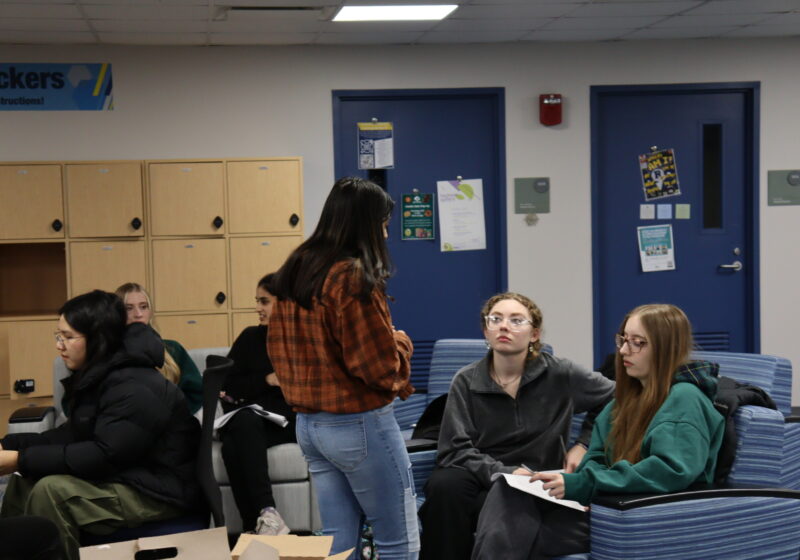Standing out amid a pool of talent and more experienced teammates is no easy task for first-year athletes.
“Being a freshman can be challenging,” said freshman outfielder Kyle Trombley, who has been a consistent starter and hitter for UR Baseball (URB). “There’s never a ton of expectation for you from the team because it’s such a big jump from high school, but you feel the need to prove your worth to the team and to the coach.”
The pressure of performing well is a reality that all athletes must learn to cope with.
“No matter what year you are, if you’re on the field you feel the pressure to perform at your very best for your teammates,” freshman midfielder Jamison Seabury, of Women’s Lacrosse (URWL), said.
In seven games, Seabury has managed to find the net ten times, trailing only two URWL veterans, junior and senior midfielders Maddy Levy and Jamie Wallisch, in goals scored.
“The seniors are always telling me to be confident, not to hold back and keep taking the ball to the net,” Seabury said, adding, “They are incredible at encouraging me to be the very best I can be.”
For freshman URB catcher David Rieth, first-year players experience a different level of pressure as compared to older players on his team.
“It puts a little more pressure on me being a freshman,” Rieth said. “I am expected to perform every game as if I am a veteran of a couple years; however, the fact that I am playing college baseball means that I can perform at the expected level, so the pressure just adds to the intensity of the game, which I love.”
Rieth has been the team’s starting catcher for all 12 games of the season.
“I would consider myself a leader because I am the catcher for most games, which is commonly considered the leader on the field,” Rieth said. “Playing there requires me to command the game by keeping the pitchers under control, as well as keeping opposing base runners in check.”
Typically, a freshman’s leadership role is more understated in nature, but it is far from non-existent.
“I would say, despite being a freshmen, I am a leader on the team just by example, whether it’s on the field working hard and encouraging my teammates, or off the field being responsible and pushing myself academically,” freshman defender/ midfielder Maggie McKenna, of URWL, said. “One major difference between being on my lacrosse team in high school versus college is the required amount of dedication and accountability being much greater here.”
Her effort appears to be paying off, as McKenna has been an integral part of the successes of URWL, which is 5–2 on the season. She has started every game and has four goals.
Other first-year players agree that the expected level of commitment that should be demonstrated to their sport is heightened in college, as compared to high school.
“The biggest difference is the the level of intensity,” freshman outfielder Jake Hertz, who has the highest batting average on URB, said. “All of the players are very good and take what they do seriously, where as in high school a lot of people played more recreationally and didn’t have the drive and work ethic that is expected of players here.”
Hertz’s fellow freshman teammate agrees.
“In high school, baseball was intense, but it was an after school thing,” Rieth said. “Now, in college, baseball is an everyday commitment, whether it be before or after class.”
The dynamic of each player’s team has shifted since high school.
“In high school the dynamic was very strong because your teammates were your lifelong friends who you grew up with,” Hertz said. “I initially thought this would be impossible to duplicate, but it is not […] the dynamic is so good here because, unlike high school, you spend all your time with your team here. We room together, eat meals together, go to class together, and practice together day in and day out.”
Freshman midfielder Marina Kern, who has eight goals and seven starts for URWL, also appreciates the opportunities for the development of relationships with teammates in college.
“The biggest change that I have seen is that everyone genuinely supports each other and wants to succeed,” Kern said. “I think that we all are extremely motivated and I have never been on a team like this.”
She emphasized the support provided by her team’s veterans.
“All of my teammates who are older have shown unconditional support for the freshman class, and this is something that we all are extremely grateful for,” Kern said.
McKenna, her teammate, elaborated.
“The best advice an older player has told me is to play with confidence,” she said. “I always try to keep this in the back of my mind before a game because I know if I’m just out there worried I’m going to make a mistake.”
For Hertz and Trombley, insights from older players have also shaped the way they view their sport in college.
“My older teammate told me a story of his freshman year, and how he didn’t play—he would come home late on weekends after being out with friends and would come back and his roommate, who was also a baseball player, would just be leaving to go to the batting cage,” Hertz said. “He told me his roommate started all four years and it was a direct result of the work ethic.”
“He made me realize if I wanted something bad enough, I would have to work for it, or I would never achieve it,” he added.
“The best piece of advice that I have gotten is to just relax,” said Trombley. “Play loose, have fun, and don’t worry so much about what everyone thinks of you.”
Without being given the opportunity from coaches and older players to show off their skill set, a freshman athlete would be hard pressed to make any significant contributions in games.
“I would say for the most part that players are treated fairly equally on the field by coaches and teammates,” McKenna said. “People aren’t not going to pass to you just because you’re a freshman, and our coach isn’t going to favor you just because you have more experience.”
This “class blind” coaching approach seems to have been adopted by the teams at UR.
“Everyone has a key role on the team and everyone is on the team for a reason and is treated equally in regards to their importance to the team,” Seabury said. “From the seniors down to the freshmen, every player is critical in making us successful.”






